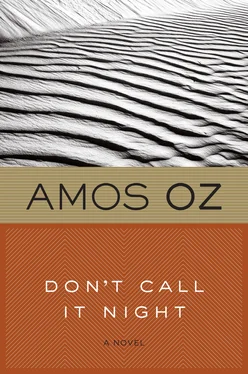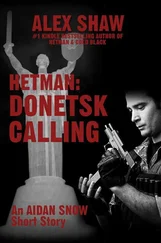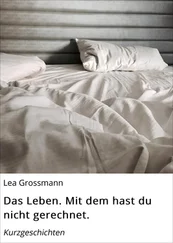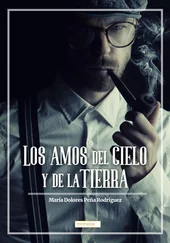I was awakened at a quarter to seven by Theo, brisk, freshly shaved, stocky, wearing a smartly pressed blue shirt with epaulettes, looking like a retired colonial soldier with his broad shoulders and his short grey hair, with the morning paper under his arm, bringing me some very hot strong black coffee that he had ground himself as usual by hand and percolated, as though he were trying to conjure up a scene in that cruel British film. Apparently in the middle of the night, instead of going to bed, I had fallen asleep on the white couch in the living room. I took the coffee from him and said, Listen, don't be angry, I promised you yesterday I'd fill the Chevrolet up on the way back from Beersheba but in the end I clean forgot. Never mind, Theo said, I'll do it myself, later, on my way to the office after I've taken you to school. It's not time I'm short of, Noa.
THEO'S office, Planning Ltd., is situated on the top floor of the building by the traffic lights. It has an outer and an inner office, a drawing board, a desk, various wall-maps, a colour photograph of David Ben Gurion staring resolutely into Nahal Zin in the desert, two metal cabinets, some shelves containing different-coloured folders, and in a corner of the outer office a couple of simple chairs and a coffee table.
Friday. Quarter past ten. On Fridays the office is always closed, but this morning Theo has come in to wait for the cleaning woman, Natalia, even though she has her own key. Until she arrives he has decided to go over one or two letters. He switches on the air conditioning and the powerful light over the drawing board. Then, changing his mind, he switches off the light and waits at the window instead. At the counter of Gilboa's, Books and Stationery, he notices a small crowd: they are waiting for the newspapers that normally arrive at nine o'clock in the morning. This morning they are late. They say the police have set up roadblocks on all the roads out of Beersheba because there has been a bank raid. Near the monument, two gardeners wearing broad-brimmed straw hats are stooping to plant new rosemary bushes in place of the old ones that have died. Theo asks himself why he should not do a bit of work this morning. At least until Natalia arrives. He might try to jot down a few preliminary thoughts about the Mizpe Ramon project: at present all that is needed is a schematic outline, perhaps a few simple drawings without any detail and not even to scale. They haven't even got a budget yet, there's been no final decision, and they still haven't asked him to send in detailed plans. He thinks for a while but cannot find within himself that spark of acuity that is essential if an idea is to emerge. What's happened to Natalia today? Perhaps he ought to try to call her, find out if anything's wrong, though he has the impression they're living in the prefabs and it's doubtful if they have a phone, and anyway she once explained to him in broken English mixed with a few Hebrew words that her husband is madly jealous and is suspicious of the faintest hint of a man, even his own old father. He thinks about her, hardly more than a child, barely seventeen and already married and downtrodden, a submissive, timid girl, between smiles her mouth seems pursed as if to weep, if you put a simple question to her she trembles all over and goes white, her waist and breasts are those of a woman but she still has the face of a schoolgirl. Desire suddenly surges up inside him, violently, like a fist clenching.
Friday. Noa is at school till twelve thirty. Then they've agreed to meet here and go to the shops together to try to choose her a skirt. He skipped his shower this morning, to hang on to the odour of her love that he can smell now, not with his nostrils but with his pores. Her laughter, her spontaneity, her body, the speck of light that capers rapidly in the pupils of her eyes — even her wrinkled hands, dappled with patches of brown pigment, so many years older than the rest of her, as though the forces of withering are patiently assembling there, waiting for a sign of vulnerability so as to spread all over her body — all seem to him to be joined to the very core of life itself. Like an electrical current she conducts life to him, too. Even if it was thinking of Natalia that aroused his desire, the flicker came from Noa and returns to her. There is no way of explaining this to her. Instead he will buy her a skirt and maybe a dress as well. And since Natalia has not come to clean the office and may not come today, there is time to stand at the window and watch the square by the traffic lights. What was the mistake that the male world made about Alma Mahler? What was Alma Mahler really like? Both questions are empty. Once, in Mexico City, during a festival of modern music, he happened to hear on successive evenings two performances of the Kindertotenlieder, one sung by a baritone with piano accompaniment, the other by a woman with a deep voice, perhaps a contralto, full of longing and yet pure and calm as though in resignation. Theo remembers that the latter was so poignantly sad that he had to get up and leave the auditorium. The second song in the cycle is called "Ah, now I know why oft I caught you gazing", and the fourth, "I think oft they've only gone a journey". These names cause him a dull ache like a single low note on the cello. The names of the other songs he cannot remember, even though he tries very hard. He must ask Noa tonight.
Under his window a woman in a headscarf passes carrying in each hand a chicken freshly killed for the Sabbath. As the woman is short and the square is dusty, the dead combs leave a trail behind them on the sidewalk. Theo smiles for a moment under his moustache and almost winks shrewdly, like an avaricious peasant who, vaguely suspecting that the man he is bargaining with has adopted a cunning ruse, starts to plot a way of eluding the trap. The woman has already vanished.
In front of the Sephardi synagogue an improvised table has been erected, a wooden door resting on two barrels. It is covered in open books, presumably sacred books that have been brought out of the closets on account of the damp and the worm to take the air in the sunshine. Half past ten and Natalia still isn't here: she won't come today. Has her husband locked her up again? Does he beat her with his belt? He must find their address right away, this morning. Go round, see if he can help, break down the door if necessary, to prevent a disaster. There's still time: Noa won't be here for another two hours. But here is the tax{i from Beersheba with the weekend papers. Limor Gilboa, Giltboa's pretty daughter, arranges them adeptly, inserting into the outer pages that have just arrived the supplements that were sent on yesterday's taxi. Gilboa himself, a tubby teddy bear of a mail full of energy, reminiscent of a trade-union hack, with his wavy grey hair, his protruding paunch, always looking as if he is about to embark on a speech, has already started selling Yediot and Ma'ariv to the crowds of people elbowing their way towards him and extending their hands. Theo jots down a little list of things that are needed for the office and decides to go down to Gilboa's to buy them when the crowd has thinned out, and perhaps also the weekend Ma'ariv before they have all been snatched up. As for the sketch he has been asked to do for Mizpe Ramon, it's not urgent, in the course of next week he may have a brainstorm. Let them wait. They certainly won't build their leisure complex over the weekend, in fact they never will. If only everything that had been done there so far could be wiped out and a fresh start made, without the hideous housing schemes, but in a low-key architectural rhythm, in a relation of proper humility to the silence of the crater and the lines of the mountain ranges. He locks the office and goes downstairs.
Читать дальше












